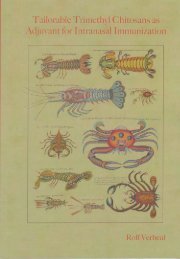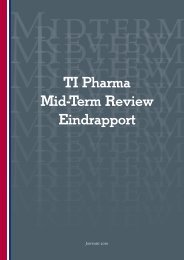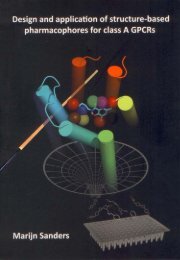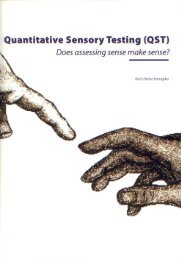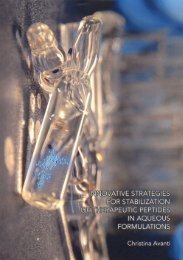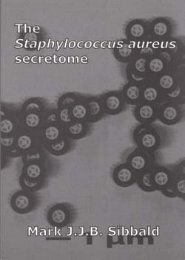Experimental infection and protection against ... - TI Pharma
Experimental infection and protection against ... - TI Pharma
Experimental infection and protection against ... - TI Pharma
Create successful ePaper yourself
Turn your PDF publications into a flip-book with our unique Google optimized e-Paper software.
Efficacy of pre-erythrocytic <strong>and</strong> blood-stage malaria vaccines can be assessed in small<br />
sporozoite challenge trials in human volunteers<br />
Introduction<br />
The development of an effective vaccine <strong>against</strong> malaria has public health<br />
priority. With an increasing number of c<strong>and</strong>idate Plasmodium falciparum (Pf)<br />
vaccines <strong>and</strong> only a limited number of field trial sites available, human<br />
sporozoite challenges are used to assess preliminary vaccine efficacy before<br />
proceeding to phase IIb trials [1]. In such phase IIa challenge trials malaria-naïve<br />
volunteers are immunized with a c<strong>and</strong>idate vaccine <strong>and</strong> subsequently exposed<br />
to the bites of laboratory-reared Pf-infected mosquitoes. Traditionally, a<br />
comparison of the prepatent period (time from challenge until positive bloodslide)<br />
between controls <strong>and</strong> vaccinees provides an efficacy estimate. The<br />
development of molecular techniques (Q-PCR) allow for a detailed analysis of<br />
blood-stage parasite growth [2].<br />
Sporozoite challenge trials are thought suitable for testing pre-erythrocytic (liver<br />
stage) vaccines, because of the natural route of exposure (mosquito bite) <strong>and</strong><br />
the full pre-erythrocytic development of Pf parasites in volunteers. To date, 30<br />
reports of combined phaseI/IIa sporozoite challenge trials are available, of which<br />
three pre-erythrocytic vaccine c<strong>and</strong>idates induced full <strong>protection</strong> [1]. One of the<br />
three c<strong>and</strong>idates is currently in phase III clinical development [3], whereas<br />
disappointing preliminary efficacy data have halted the clinical development of<br />
others [4, 5]. This illustrates the importance of challenge trials in the clinical<br />
development path of pre-erythrocytic vaccines.<br />
Preliminary efficacy testing of asexual erythrocytic (blood-stage) stage vaccines<br />
is more complex, since vaccine efficacy can only be obtained by evaluating<br />
blood-stage parasite growth over a sufficient lengthy period of time. However,<br />
blood-stage parasitemia is terminated by curative anti-malarial treatment at<br />
0.0001% infected erythrocytes, limiting parasitemia to an interval of one to six<br />
days only (mean 1.7 multiplication cycles) [6]. Immunological effects have to<br />
exert significant parasite inhibition in this short period in order to ensure<br />
detectable vaccine efficacy, making the use of challenge trials for erythrocytic<br />
vaccine c<strong>and</strong>idates controversial. To date, only two erythrocytic malaria vaccine<br />
c<strong>and</strong>idates have been subjected to sporozoite challenge (Apical Membrane<br />
Antigen 1 <strong>and</strong> Merozoite Surface Protein 1) [7, 8]. Analysis of parasitological<br />
data from two of these trials revealed an apparent pre-erythrocytic inhibiting<br />
effect, but could not show blood-stage inhibition (S.H. Sheehy pers. comm.) [7].<br />
119



